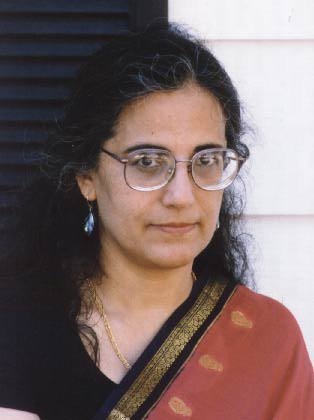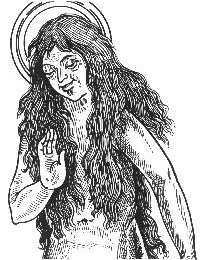Lalita Pandit

Lalita Pandit
e-mail: pandit@mail.uwlax.edu
Lalita Pandit is a
Professor of English at the University of Wisconsin -La Crosse where she teaches
courses in Shakespeare, Literary Theory, International Studies in Literature,
and general writing and communication courses. Her published books include, Criticism
and Lacan: Essays and Dialogue on Language, Structure, and the Unconscious,
edited with Patrick Colm Hogan, published by the University of Georgia Press,
1990 ; Literary India: Comparative Studies in Aesthetics, Colonialism, and
Culture, edited with Patrick Colm Hogan , State University of New York
Press, 1995; Comparative Poetics: Non-Western Traditions of Literary Theory,
edited with Patrick Colm Hogan, Special Issue of College Literature. 23. I Feb.,
1996. Pandit is an associate editor of the journal College Literature.
Pandit is currently working on putting together a
volume of essays, with Patrick Colm Hogan, on Rabindranath Tagore. It is based
on papers presented at the International Conference on Tagore's work, Home
and the World: Rabindranath Tagore at the end of the Millennium, that took
place at the University of Connecticut, Storrs, CT, September 18-22, 1998.
Pandit was one of the organizers of this landmark conference that was mentioned
in India Abroad.
Pandit's published essays and book chapters include
"Dhvani and "the full word": Suggestion and Signification from
Abhinavagupta to Jacques Lacan" (1996); "Non-Western Literary Theories
and What do with Them" (1996); "Patriarchy and Paranoia: Imaginary
Infidelity Uttaramcarita and The Winter's Tale" (1995);
"An Interview with Anita Desai" (1995); "Caste, Race, and Nation:
History and Dialectic in Rabindranath's Gora" (1995).
Four of Pandit's Hindi poems, "Devsar main
Dhu:svapna," "Vismriti," "Vairagya," "Samay aur
Surya," were published in Vishva Viveka, 7: 3, 1998 (an
International Hindi Magazine From USA).
Over the years, Pandit has presented numerous papers at
national and international conferences on subjects as diverse as Shakespeare,
African Authors, various Indian Authors, and on theoretical subjects. She is
currently working on a book manuscript titled "Comparative Dramaturgy:
Indian Aesthetics and Shakespearean Drama." Pandit has been awarded a
research grant and a sabbatic leave grant to complete this project.
At the coming year's conference of the Asian Studies
Association of America, Pandit is planning to present a paper on
Shankaracharya's and Lalleshvari's devotional poetry. At the Tagore Conference
mentioned above, she presented a paper, "Romantic Love in Gora:
Tagore's uses of Shringara, Bhavana, and Rasadhvani." Pandit is also
currently working on a long overview essay on all the scholarly work done on
Shakespeare's influence on James Joyce. This essay will be included in an
Internet publication, an Overview of Influence Studies of James Joyce's Work. In
addition, Pandit has an essay forthcoming, "Anti-Colonialist Agon and
Fashioning of Female Identity in Bessie Head's A Question of Power,"
in Keepers of the Flame: Power, Myth and Cultural Consciousness in Ethnic
Female Identity, eds. Sondra O'neale and Cynthia Tompkins, Wayne State
University Press, 1998.
Pandit's published work mentioned above has received
numerous highly positive reviews in scholarly journals in the US, in France, and
other places. For example, Martha Ann Selby, in a review in the Journal of
Asian Studies (56: 2, May 1997), says about Pandit's authorial contributions
to Literary India: "the volume's co-editor, Lalita Pandit, is the
true star of the collection," "this is comparative literature at its
very best." The same reviewer refers to Pandit's interview with Anita Desai
as " a superb interview," and calls it "the very soul of the
book." Comparative Poetics: Non-Western Traditions in Literary Theory
was one of the three finalists for the Council of Editors of Learned Journals'
Best Special Issue Award for 1996. One of the judges made special mention of the
essays on Indian/Kashmiri (Abhinavagupta's and Anandavardhana's) aesthetics.
He/she said, "this issue will certainly become an important scholarly
resource in the future. I was especially impressed by contributions of Hogan,
Pandit, and Heidinger" (Dec. 1996).
Sukeshi has a Dream
Finally, a significant number of KPnet
readers have made highly laudatory comments on the poems that appear in Sukeshi
has a Dream and Other Poems of Kashmir. More than any other words of
praise, these words spoken by expatriate Kashmiris, who share the loss of
history, home, heritage, and culture with Pandit, hold a special value for her.
Sukeshi
has a Dream and Other Poems of Kashmir is part of a larger poetry
collection, about to be submitted to presses. The genesis of this volume has to
do with Pandit's years of intense engagement with teaching literature and
literary aesthetics in a cross cultural context, and her theoretical interest in
the science of Aesthetics. Above all, this collection owes its existence to
Pandit's strongly felt need for creative expression in the face of a violent
erasure of the Past: Historical and Personal.
Poetic metaphor holds contradictory states of mind
together. Poetic logic is paradoxical. Lyrical Poetry evokes the unspoken by
inventing a speech pattern, a voice, a consciousness. It transforms the ordinary
into something rare. Working on these poems has been an intensely joyful
experience for Pandit, even when the content of many of these poems is
sorrowful. Poetry converts sorrow into joy, loss into gain, past into present
and future, history into myth, the private into the public.
 Sukeshi
Has A Dream Sukeshi
Has A Dream
Sukeshi has a Dream and Other Poems of Kashmir
is part of a larger poetry
collection, about to be submitted to presses. The genesis of this volume has to
do with Pandit's years of intense engagement with teaching literature and
literary aesthetics in a cross cultural context, and her theoretical interest in
the science of Aesthetics. Above all, this collection owes its existence to
Pandit's strongly felt need for creative expression in the face of a violent
erasure of the Past: Historical and Personal.
>>>
|
|
















No one has commented yet. Be the first!